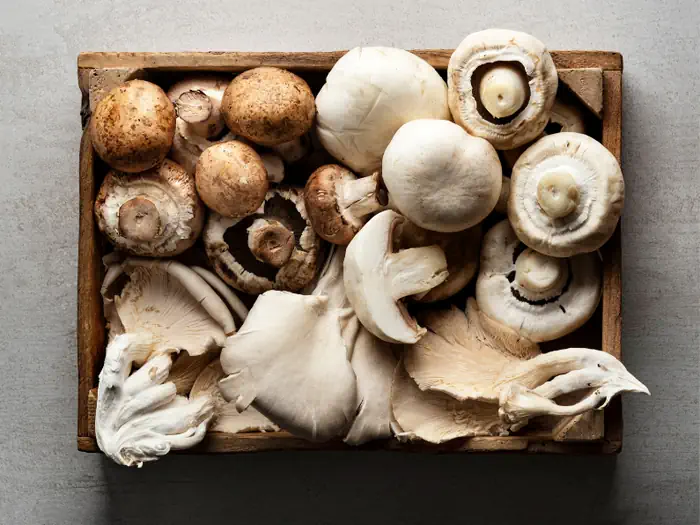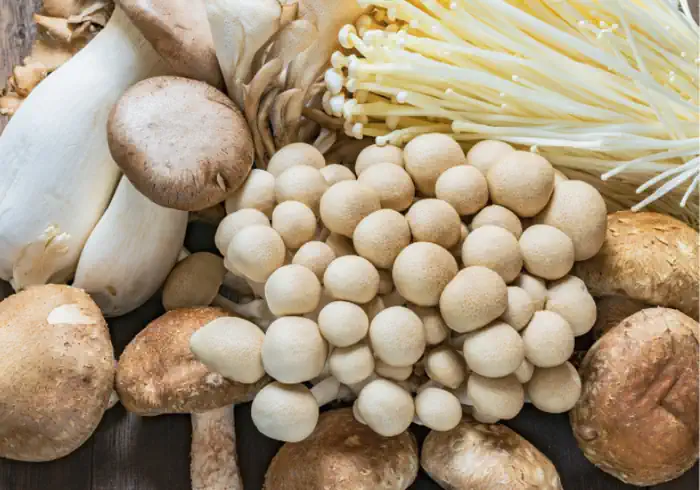Eating mushrooms has long been a part of the culinary traditions around the world, but did you know that they offer significant health benefits, too? From boosting your immune system to helping keep cholesterol levels in check, adding mushrooms to your diet could be just what you need to live a healthier lifestyle.

Let’s take a look at five surprising health benefits of eating mushrooms.
Mushrooms are an incredibly versatile ingredient with many potential uses – both in cooking and for improving your overall wellbeing. Not only can they add flavor and texture to meals, but their nutritional profile makes them one of nature’s superfoods.
Adding more mushrooms into your diet could help you feel better and give you the freedom to enjoy life without worrying about every little thing affecting your health.
Read on to learn all about the top five health benefits of eating mushrooms!
Immune System Boost
The coincidence of enhanced immunity and increased energy can be found in something as simple and delicious as eating mushrooms. While many people think of them as a side dish, they provide far more than just flavor; they also have abundant health benefits that are often overlooked.
Mushrooms contain vitamin C, B-complex vitamins, selenium, and tryptophan – all essential for boosting the immune system and keeping our bodies healthy. Research indicates that consuming mushrooms on a regular basis could help prevent chronic illnesses such as heart disease and cancer.
In addition to their nutrient content, mushrooms are rich in antioxidants which fight inflammation throughout the body; this helps maintain balanced blood sugar levels for improved energy throughout the day.
Adding an extra serving or two of mushrooms into your diet is an easy way to increase antioxidant intake without adding too much fat or calories to your meals. Plus, there’s no need to give up taste either – there are plenty of ways to incorporate mushrooms into any recipe while still having it taste great!

So go ahead and enjoy some ‘shrooms today: you won’t regret it once you experience the powerful health benefits they bring.
Cholesterol Reduction
Mushrooms are a unique superfood that can contribute to improved health in many ways. One of the most impressive benefits is their ability to reduce cholesterol levels and help with blood pressure regulation.
For starters, mushrooms contain no cholesterol or saturated fat, making them an ideal food choice for people concerned about managing their weight. They also provide essential vitamins and minerals such as selenium and B vitamins which play an important role in maintaining healthy cholesterol levels.
Some studies have shown that certain types of mushrooms can be effective at lowering LDL (bad) cholesterol while increasing HDL (good) cholesterol.
Research suggests that eating mushrooms regularly may even help to regulate your blood pressure by reducing inflammation in the body.
These incredible benefits make mushrooms one of nature’s most powerful weapons against heart disease and other cardiovascular conditions. By adding more mushrooms into our diets we can enjoy better overall health without compromising on taste!
Anti-Inflammatory Properties
Mushrooms offer a wide range of health benefits and anti-inflammatory properties are one such benefit. They contain compounds that can reduce inflammation in the body, helping to protect against numerous conditions associated with chronic inflammation.

Not only is this great for overall health but it also has some impressive anti-aging effects as well.
The anti-inflammatory compounds found in mushrooms have been shown to help regulate blood sugar levels as well – another added bonus! This makes them an ideal addition to any diet and can be especially helpful for those who suffer from diabetes or prediabetes.
Studies have even revealed that regular consumption of mushrooms may lower the risk of developing type 2 diabetes later in life.
Regular intake of mushrooms not only provides powerful anti-inflammatory protection, but their ability to regulate blood sugar make them a smart choice when looking to improve your overall health and wellbeing.
With a variety of types available and easy preparation methods, adding these nutrient-rich fungi into our diets is becoming more commonplace – and rightly so!
Improved Digestion
Gut health is an important yet often overlooked aspect of overall wellbeing. It’s time to give it the attention it deserves, and one way to do that is by adding mushrooms to your diet.
Eating mushrooms can have a big impact when it comes to improving digestion and increasing nutrient absorption in the body. Mushrooms contain prebiotic fibers that feed beneficial bacteria in the gut, giving them a much-needed boost for better functioning. This helps with improved gut health as well as increased nutrient absorption from other foods digested along with the mushroom fibers.

As if this weren’t enough, some types of mushrooms also contain antioxidants which help reduce inflammation in the digestive tract, promoting even better digestion. Not only can eating mushrooms increase nutrient absorption and improve gut health, but they are also incredibly nutritious for all kinds of diets. They provide essential vitamins and minerals such as B vitamins, selenium, potassium, copper, phosphorus, zinc and more.
With their wide range of benefits there’s no wonder why these little fungi should be part of every healthy meal plan!
Cancer-Fighting Benefits
Moving on from the improved digestion benefits of mushrooms, another amazing advantage is their cancer-fighting properties.
Mushrooms are rich in a variety of compounds that have anti-cancer effects, including polysaccharides and proteins which can act as antioxidants. This means they may be able to reduce oxidative damage caused by free radicals, while also boosting your immune system to help protect against cell mutations.
Certain types of mushrooms such as shiitake and maitake contain an active ingredient called lentinan which has been found to inhibit tumor growth.
Other Benefits of Eating Mushrooms
Mushrooms can also provide other health benefits beyond fighting cancer cells. Studies show that eating mushrooms regularly helps improve blood sugar control and reduces risk factors for heart disease such as high cholesterol or triglyceride levels.
They’re low in calories so you don’t need to worry about consuming too many when adding them into your meals!
Additionally, some varieties like oyster and enoki mushrooms offer plenty of B vitamins plus minerals like zinc, selenium, copper and potassium – all important nutrients for good overall health.

So why not start incorporating more mushrooms into your diet? Not only do they add great flavor but they’re packed with powerful nutrients that could potentially make a big difference to your overall wellbeing.
Whether it’s helping combat cancer-causing agents or reducing inflammation due to its antioxidant potentials; these fungi really should become part of our daily lives if we want to maximize our wellness potentials!
In Summary
Mushrooms are an incredibly nutritious and delicious food source that offer a wide range of health benefits.
They can help boost the immune system, reduce inflammation, manage cholesterol levels and even protect against certain forms of cancer.
Eating mushrooms is not only healthy but also cost-effective and easy to incorporate into many dishes.
To get the most out of these amazing fungi, it’s important to know which varieties to buy, how often to eat them and how best to prepare them for optimal nutrition.
As they say, don’t let their small size deceive you; mushrooms truly pack a powerful punch!
Frequently Asked Questions
There are many different kinds of mushrooms, and each variety can have its own unique set of health benefits. Here are some of the health benefits associated with a few popular types of mushrooms:
- Shiitake mushrooms: These mushrooms contain compounds that have been shown to boost the immune system and may have anti-tumor effects. They are also a good source of vitamins B and D.
- Portobello mushrooms: These mushrooms are a good source of antioxidants, which help to protect the body against oxidative stress. They are also low in calories and high in fiber, making them a good choice for weight management.
- Maitake mushrooms: These mushrooms have been shown to have anti-inflammatory effects and may help to regulate blood sugar levels. They also contain compounds that may have anti-cancer effects.
- Oyster mushrooms: These mushrooms are a good source of protein and fiber, and they contain compounds that have been shown to have anti-inflammatory effects. They may also help to lower cholesterol levels in the blood.
- Reishi mushrooms: These mushrooms have been used in traditional Chinese medicine for centuries to boost the immune system and improve overall health. They may also have anti-inflammatory and anti-cancer effects.
It’s worth noting that more research is needed to fully understand the health benefits of each type of mushroom, and it’s important to always cook mushrooms thoroughly before eating to avoid potential health risks.
So if you’re looking for a way to boost your nutritional intake while adding a little flavor to your meals, make sure you explore the wide variety of mushrooms available before deciding on which is best for you.
When it comes to eating frequency and portion size of mushrooms, there isn’t one answer that fits all. It depends on what type of mushroom you’re consuming and why—for general health or specific wellness goals.
Generally speaking, adding even small portions of mushrooms into your diet several times a week can help improve your overall wellbeing, providing the freedom to enjoy life without worrying about health issues.
- Allergic reactions: Some people may be allergic to mushrooms, which can cause symptoms such as skin rash, itching, swelling, and difficulty breathing.
- Digestive issues: Some people may experience digestive issues such as stomach cramps, bloating, and diarrhea after consuming mushrooms.
- Toxicity: Some wild mushrooms can be toxic and can cause serious health problems or even be fatal if consumed. It is important to only consume mushrooms that have been properly identified as safe for consumption.
- Interactions with medication: Some types of mushrooms may interact with certain medications, such as blood thinners and diabetes medications.
- Contamination: Mushrooms can easily become contaminated with bacteria, such as E. coli and salmonella, if they are not handled and cooked properly.

It is important to cook mushrooms thoroughly before eating, store them properly, and only consume mushrooms that have been properly identified as safe for consumption. If you experience any adverse reactions after consuming mushrooms, seek medical attention immediately.
In addition, the health benefits of different types of mushrooms can vary. For example, shiitake mushrooms are a good source of immune-boosting compounds, while lion’s mane mushrooms may have cognitive-enhancing effects. Other types of mushrooms, such as button mushrooms, may not have as many health benefits as other varieties.
It’s important to include a variety of different types of mushrooms in your diet to reap the potential health benefits, but it’s also important to do so in moderation and to always properly cook and handle mushrooms to avoid potential health risks. As always, it’s important to talk to your healthcare provider before making any significant changes to your diet.

Roasting is an ideal way to bring out intense flavor without sacrificing nutritional value, while sautéing allows for a longer cooking time so you can draw out even more nutrients from them.
Here are some cooking methods that can help to optimize the health benefits of mushrooms:
- Grilling: Grilling mushrooms can help to bring out their flavor and make them crispy on the outside while still retaining their nutrients. It is important to brush the mushrooms with a little bit of oil before grilling to prevent them from sticking to the grill, or grill them on a pad of aluminum foil.
- Roasting: Roasting mushrooms in the oven can help to concentrate their flavor and make them tender.
- Sautéing: Sautéing mushrooms in a little bit of oil can help to bring out their flavor and make them tender. It is important to not overcook them to preserve their nutrients.
- Steaming: Steaming mushrooms is a gentle cooking method that can help to preserve their nutrients. It is important to not overcook them to prevent them from becoming mushy.
- Eating them raw: Some mushrooms, such as white button mushrooms, can be eaten raw in salads or as a snack. Eating them raw can help to preserve their nutrients, but it is important to wash them thoroughly before consuming them.
It is important to note that while these cooking methods can help to preserve the nutrients in mushrooms, it is also important to handle and store mushrooms properly to avoid potential health risks.
Not only will these methods optimize your mushroom’s healthful properties, they’ll also give your dishes a delicious boost of flavor – freeing up your taste buds to explore new flavors.
